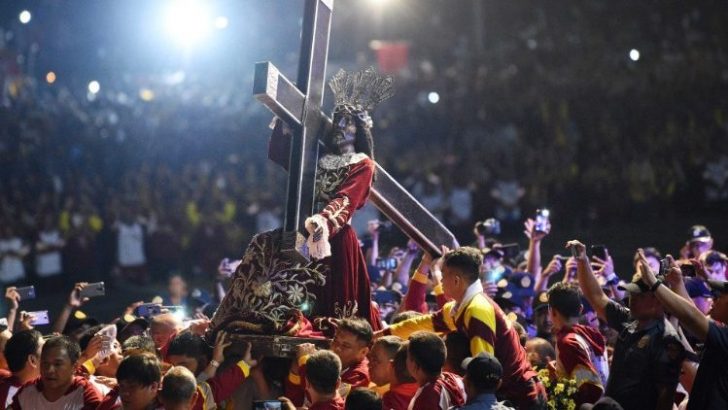Black Nazarene procession in Philippines cancelled over coronavirus
Due to the coronavirus pandemic, civil and ecclesial authorities in the Philippines have agreed to cancel the Black Nazarene celebration in 2021, which gathers millions of churchgoers in Manila each January.
Known as the traslacion, the 19-hour procession through the streets of Manila takes place each year on January 9. Millions of pilgrims take part in the seven-kilometer procession.
The statue of the Black Nazarene is a kneeling Christ cloaked in a maroon robe and crowned with thorns. The life-sized statue bears a cross.
It was brought to the Philippines by Augustinian missionary priests in 1606. The statue is believed to have acquired its black colour after being partially burnt when the ship carrying it caught fire on a voyage from Mexico.
Controversy continues over Scotland’s hate crime bill
Amid a contentious debate in Scotland over a proposed hate crime law, which the Catholic bishops of the country oppose, a cabinet minister this week suggested that the law could apply to speech uttered within a private dwelling if the speaker intends to stir up hatred.
During an October 27 hearing, a Scottish parliament member questioned Justice Secretary Humza Yousaf about whether the bill might include a defence for speech uttered in the privacy of one’s home, a so-called “dwelling defence”.
“My concern with the dwelling defence…as a parliament, [and] even as a society, are we comfortable with giving a defence in law to somebody whose behaviour is threatening or abusive – as an example, that is intentionally stirring up hatred against Muslims – are we saying that that is justified because it is in the home?” Mr Yousaf replied.
Paris’ Sacre-Coeur Basilica to be classified as a protected historic monument
Sacré-Cœur Basilica in Paris [pictured] is expected to be classified as a protected historic monument by France’s Minister of Culture.
The Catholic basilica, which is dedicated to the Sacred Heart of Jesus, is one of the most visited sites in Paris, and since August 1, 1885, has been home to perpetual Eucharistic adoration.
“The Sacré-Cœur is one of the symbols of Paris,” Laurent Roturier, the director of France’s cultural affairs office, said. “It has been the most-visited building in Paris since Notre-Dame has been in repair.”
“But even more astonishing is that it is not protected as a historic monument. This is a sign of the slow recognition of 19th-century architecture,” he added.
Pope Francis’ general audience again moves behind closed doors
After nine weeks of public general audiences, Pope Francis’ weekly gathering will again take place behind closed doors, the Vatican said October 29.
The decision to move back to a livestream-only format was made after at least one person in attendance at the Pope’s October 21 audience was discovered to have been positive for Covid-19, according to the Vatican.
Starting Wednesday, November 4, Francis will give his general audience catechesis and greetings via live video from his study in the Apostolic Palace, “in order to avoid any future health risks for participants”.
From September 2, members of the public were permitted again to attend his weekly audience at the Vatican, after a more than six-month break, but this has come to an end.


 The procession of the Black Nazarene in Manila, the Philippines, January 9, 2019. Photo: CNS
The procession of the Black Nazarene in Manila, the Philippines, January 9, 2019. Photo: CNS